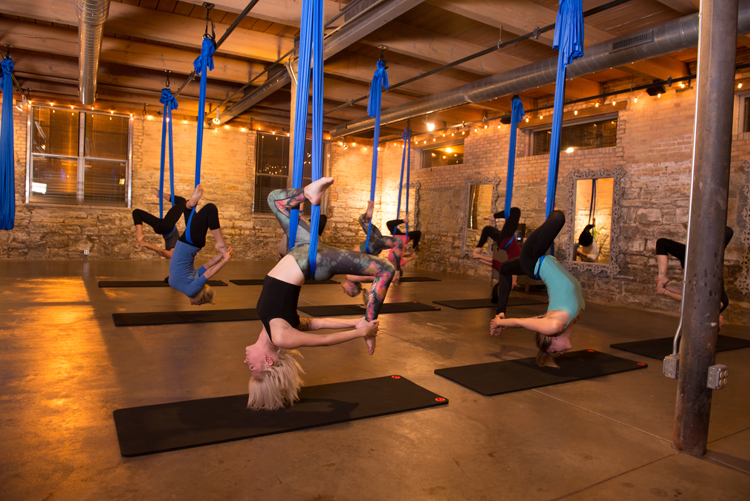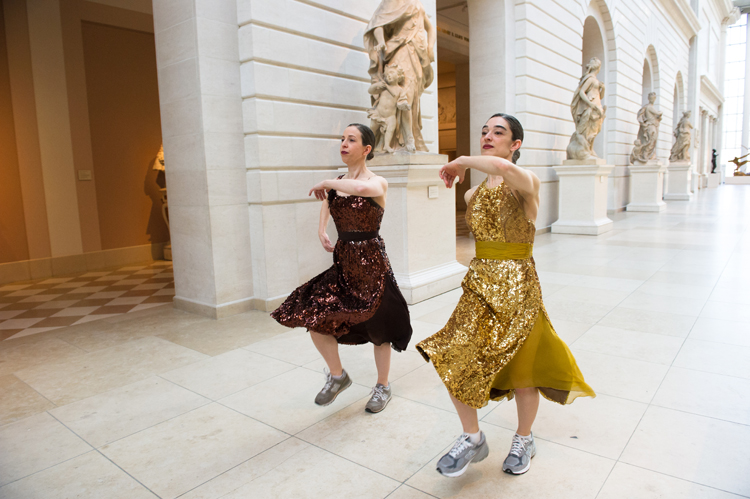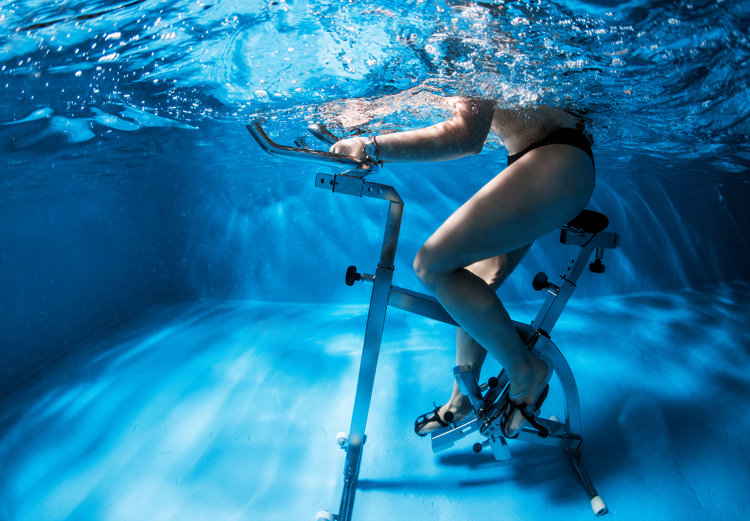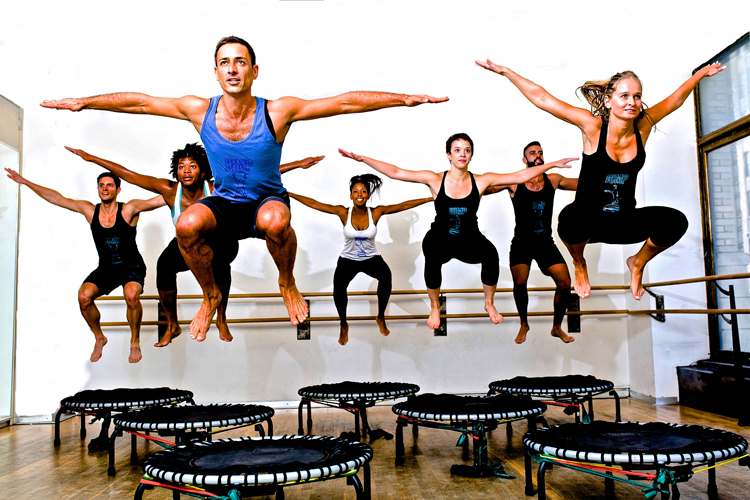The following story is excerpted from TIME’s special edition, The Science of Exercise, which is available at Amazon.
If your exercise routine is in need of an update, look no further. Exercise isn’t boring with these four innovative (and wacky) fitness routines.
Aerial fitness

Christine Longe (not shown), The Aviary
I’m the type of person who is easily bored by group fitness classes. (I also hate cardio.) I’ve tried yoga, Pilates and spinning, but I always end up just watching the clock. One day, I learned about a local circus workshop and decided to enroll. I fell in love with aerial acrobatics and committed myself full-time to circus exercises. Soon my friends were asking how I got such toned arms. “All I do is circus stuff!” I’d say.
I then decided that more people could benefit from this type of exercise if it were more accessible—and lower to the ground. I bought several aerial hammocks (large swaths of fabric that can hold 2,000 pounds) and opened my first aerial fitness studio in Minneapolis. Using the fabrics, I developed a body weight-training workout that uses strength exercises inspired by Pilates and barre as well as aerial moves. I tell every new client that aerial fitness is not about getting skinny; it’s about getting strong. When you’re up in the air, you have to hold up your body weight and engage your core to keep a pose steady. That’s part of what makes this type of exercise so effective. People are willing to put in the work to get strong because they want to be able to do the fun aerial moves.
People are often terrified before they go upside down for the first time, but once they get there, they always start giggling and laughing. Aerial exercises are something anyone can do with practice. I think that’s one of the things that makes this type of exercise so special: people build up the courage to be vulnerable and try something new, and when they achieve something they couldn’t do before, they want to keep coming back.
Museum workout

Monica Bill Barnes (right), Anna Bass (left) and Robert Saenz de Viteri, Monica Bill Barnes & Company
Three years ago, our dance company was approached by the Metropolitan Museum of Art in New York to create a performance for the museum. It was an incredible opportunity, and we decided to try something different: we developed a workout that the public could do while walking throughout the museum, looking at art. The museum agreed, and the Met Workout was born.
During the 45-minute workout, held before the museum opens to the public, we lead people around the Met with exercises like speed walking, arm pumping and squats. Our route spans two miles, with stops at around 13 pieces of art. We play fun music as well as narrations about the art. It’s equal parts workout, performance and guided tour. All the movements in the Met Workout are easy to follow, but people still work up a sweat.
Though we are classically trained dancers, and not aerobics instructors or exercise fanatics, we spend a lot of time being physical and finding unique ways to use the space around us. We’ve always loved the idea that physical activity can open us up to perceiving things in different ways, which is why we wanted to make the experience of visiting a museum even more special.
The response has been incredible. The workouts sell out quickly, and so far males and females ages 12 to 86 have joined in the fun. Just the fact that this type of experience exists feels revolutionary.
![TIMEScienceExercise2017BAZ_cover[1]](https://api.time.com/wp-content/uploads/2017/06/timescienceexercise2017baz_cover1.jpg?quality=75&w=2400)
Underwater cycling

Esther Gauthier, AQUA Studio
I am originally from France, and about five years ago I took an aqua cycling class in Paris and fell completely in love with it. I used to swim growing up, and I thought it was brilliant to put a bike in the water and work out in the pool in a different way.
I decided to open my own underwater cycling studio in New York, to see if other people liked it. At AQUA Studio, our bikes are submerged in four feet of water, and we offer a variety of workouts that range from interval training to restorative classes.
Water has natural healing properties, which is why it’s so healthy to work out in the pool. Compared with cycling on land, cycling in the water is a full-body workout. While we pedal, we also practice some swimming strokes, so people work their legs and their arms at the same time. The water also provides a lot of resistance that you don’t get from normal biking.
Underwater cycling is actually inspired by physical therapy techniques. People who are injured often undergo rehabilitation in the water since it puts less pressure on their muscles and joints. Water is also more forgiving because it supports your body weight.
What I like about cycling in the water is the natural massage you get as you pedal. Being in the water also makes exercise really fun, and it’s the type of exercise people can do every single day if they want.
Best of all, I love how happy people are after class. I think this comes from how therapeutic the water it is. Often people arrive at the studio stressed out about work or their commute, but once they’re in the water, they release a lot of tension. Trying a new type of fitness like this can be intimidating, but I always tell people that this type of exercise is first and foremost about feeling good.
Trampoline workout

Louis Coraggio, trampoLEAN
Growing up in Lindenhurst on Long Island, New York, I always loved bouncing up and down on the trampoline in my backyard. Years later, I discovered there was a way to teach fitness classes using small trampolines, and I opened my own trampoline fitness company, called trampoLEAN.
During my classes, people are on a trampoline for a full 50 minutes. We may do some low jumping for a couple minutes, then some push-ups, followed by some balance moves. It’s not an easy workout, but people have a great time when they let loose and have fun.
Sometimes people worry that they will get injured on a trampoline. But the trampolines in my classes are very safe and low to the ground. The workouts are actually lower-impact than other types of exercises, such as running.
Trampoline workouts help circulate blood and oxygen to all the tissues in the body, including the brain. They’re also calorie scorchers, and the repetitive movements of jumping up and down build healthy muscle.
Most importantly, trampoline workouts are really fun. They take you back to the happy days of being a kid—which feels good for both the body and the mind.
More Must-Reads from TIME
- Cybersecurity Experts Are Sounding the Alarm on DOGE
- Meet the 2025 Women of the Year
- The Harsh Truth About Disability Inclusion
- Why Do More Young Adults Have Cancer?
- Colman Domingo Leads With Radical Love
- How to Get Better at Doing Things Alone
- Michelle Zauner Stares Down the Darkness
Contact us at letters@time.com